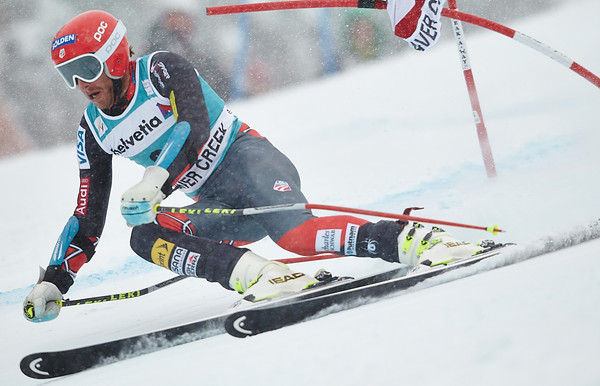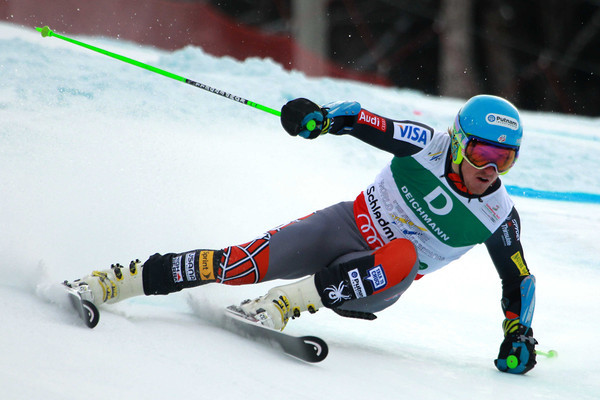Tim Burke finished third in a World Cup biathlon Sunday in Pokljuka, Slovenia, his first podium finish since the 2010 season, highlighting an extraordinary weekend for American athletes on skis.
Burke's third-place in the 15-kilometer mass start marked his fourth career top-three finish.
"I feel like I'm back in the form I had before," Burke said over the phone. "And I'm more confident now."

Comparing Burke's achievement to those of other Americans over the weekend is, of course, something of apples to oranges. After all:
In Alta Badia, Italy, on Sunday, alpine racer Ted Ligety dominated a giant slalom to win by 2.04 seconds over Austria's Marcel Hirscher. It was Ligety's 14th career giant-slalom victory, tying him for fourth on the all-time wins list.
On Saturday, in snowy, foggy Val Gardena, Italy, downhiller Steven Nyman, starting 39th -- won. He missed all of last year with a torn left Achilles' tendon. Nyman's last top-three finish: 2007, at Beaver Creek, Colo.
Also in Val Gardena, Travis Ganong put down a career-best tenth.
In freestyle skiing on Saturday in Ruka, Finland, Heather McPhie -- relying on her back-X and signature D-spin -- notched her first World Cup victory in three seasons; on the men's side, Jeremy Cota took third. Four U.S. women placed in the top 10 and three American men in the top six.
In World Cup snowboard-cross racing Friday at Telluride, Colo., two-time Olympic champion Seth Wescott -- who was out much of last year with a shoulder injury -- won a photo finish in a blizzard to prevail over Australia's Alex Pullin, who had beaten him in the quarterfinals and semifinals.
Wescott and X Games champ Nate Holland won Saturday's team event.
"It feels really good to be back," Wescott said after winning Friday's race, adding, "…When I hole-shotted that first one, I said, 'Here we go, I love doing this.' "
In men's halfpipe Saturday in Breckenridge, Colo., on the Dew Tour, Shaun White and Louie Vito went one-two, White throwing an enormous signature double McTwist 1200 in his first run to score 95.25; Kaitlyn Farrington -- who debuted back-to-back 900s for the first time in her competition run -- won the women's event, Maddy Schaffrick taking third.
"I am excited! After coming off a knee injury this summer I am glad to be on top," White said. "I feel great and am pumped for the season. This is the road to Sochi!"
Also in Breckenridge, in the women's freeski superpipe, Brita Sigourney and Maddie Bowman went 1-2, Sigourney winning in her first competition after suffering a knee injury last February and training hard at the U.S. Ski Team's Park City's Center of Excellence workout facility all summer.
And Jamie Anderson won the slopestyle event, her run featuring spins in all four directions: a half cab 5-0, frontside 720, switch backside 540 and, finally, a huge 540 that she floated to the bottom.
In cross-country skiing, at the World Cup sprints Saturday in Canmore, Canada, Kikkan Randall took second, behind Norway's Maiken Kaspersen Falla. Randall leads the World Cup sprint standings; she moved up to second in the overall standings. The top American man, Andy Newell, finished fifth.
With all that … Tim Burke? And third place?
Yes.
Tim Burke.
Because biathlon, and Burke, are all about context, promise and opportunity.
The U.S. biathlon team has never -- again, never -- won an Olympic medal and Burke is one of its best bets to do so at the Sochi 2014 Games.
Burke also said by phone Sunday about his third-place finish, "This is big for me," and those words hold way more than just the obvious.
Amid his breakout 2010 season, Burke turned up with a painful condition, "compartment syndrome," that's not uncommon to Nordic skiers. The surgery and recovery had kept him out of the spotlight since.
But it was clear as the weekend's events progressed that Burke was on the verge of breaking through. He finished fourth in the 10k sprint and seventh in the 12.5 pursuit.
A biathlon primer: only 30 guys start in the 15k mass start, and those 30 must qualify. Of the 30 in Sunday's race, only two were North Americans -- Burke and Canada's Jean Philippe Leguellec, who would finish 21st.
Only one guy shot clean Sunday, Andreas Birnbacher of Germany. No surprise -- he won.
Jakov Fak of Slovenia, the winner of Thursday's sprint, missed just two shots. He finished just five seconds ahead of Burke.
Burke shot clean in the first two stages, then incurred a single penalty on the each of the last two stages.
He crossed the finish line a mere 3.3 seconds ahead of Martin Fourcade of France, the current World Cup leader. The solid weekend in Pokljuka lifted Burke to sixth in the overall World Cup standings.
What-ifs are usually of no consequence -- but in this instance, it's worth noting that if Burke had shot clean, his skiing is once again sound enough again that he might well have won Sunday's race.
The only reason to bring that up is that finishing third is the kind of thing that makes a guy think he can get to first, and -- just as importantly -- challenge for that top spot consistently.
"It's one thing," Burke said, "to know your training is going well, to think you can do this in a race.
"It's another to do it in a race.
"Now I know."









